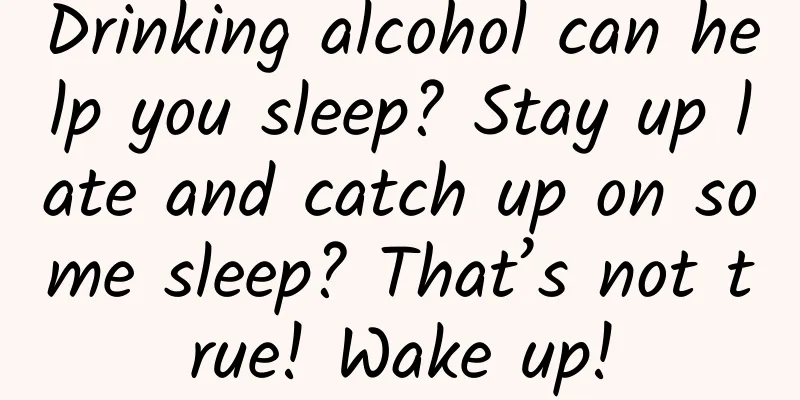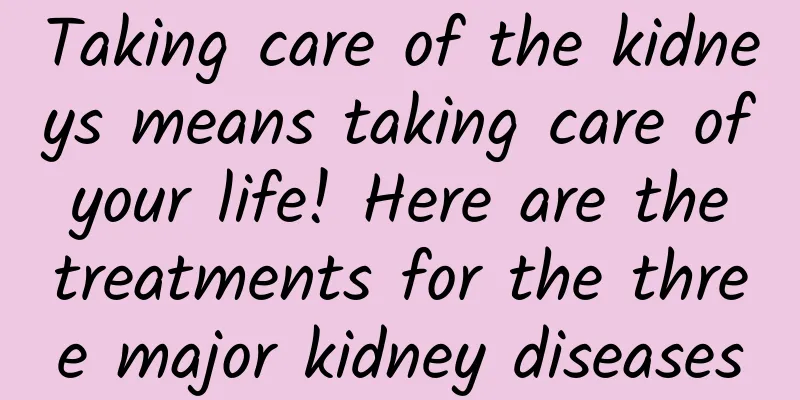Drinking alcohol can help you sleep? Stay up late and catch up on some sleep? That’s not true! Wake up!

|
When the season of "frozen hands and feet" comes, what is the happiest thing to do? Friends who share the same feeling unanimously said that the happiest thing is to get into a warm bed and sleep! However, with the accelerated pace of modern life, many people are unable to rest on time, and staying up late has become commonplace. Many people believe that the accumulated fatigue or lack of sleep over a long period of time can be compensated by a one-time long sleep, or they can take some "diet therapy" to improve their defense. So, are these methods scientific? Do you know these myths about sleep? A glass of milk before bed, healthy and helps you sleep? Then you probably have to drink a ton. If you don't sleep well and feel tired, can you drink a cup of hot milk to help you sleep and supplement calcium? The reason why people think that milk can promote sleep is that it is rich in tryptophan. But if you want to rely on tryptophan to make your body fall asleep quickly, it's a bit unrealistic. Because the amount of tryptophan contained in just one cup of milk is not enough to promote sleep. Many people drink a cup of hot milk before going to bed and feel that their sleep has improved, which is basically a psychological effect. Do you work overtime and stay up late during the week, so you want to sleep a little longer on the weekends to make up for it? Look at the fat on your belly, how can you still sleep? “If I have to work overtime and stay up late at night, I can just make up for the sleep tomorrow.” Can you really “make up” for the sleep you missed? Catching up on sleep is just a short sleep to rest the brain. If it lasts too long, it will disrupt the biological clock and cause habitual insomnia. Studies have shown that staying in bed to catch up on sleep not only delays the secretion of melatonin, but also reduces the effect of insulin. The disrupted biological clock may even make you feel more tired. A disrupted biological clock affects metabolism and may also cause cardiovascular and cerebrovascular diseases and diabetes. Therefore, staying in bed to catch up on sleep on weekends is actually adding burden to the body. As you get older, do you sleep less? Can you please care about the health of your elders? Friends who have elderly people at home will find that the elders usually "sleep very little", go to bed early and get up early, and even sit upright on the bed or by the window before the rooster crows. Do you need less sleep when you are older? Not really. The elderly have a lot of sleep needs. For example, my grandfather, who is 80 years old, can sleep soundly and can sleep longer than young people. Most elderly people sleep less because of physiological or pathological reasons. As they age, their shallow sleep deepens, they are more sensitive to environmental factors, and they wake up more often, which leads to less sleep over time. Pathological sleep disorders, chronic pain, neurological diseases, etc. can also affect the sleep of the elderly. Can't sleep, want to drink some wine? Do you want me to give you another cucumber shot? As a "social person", it is estimated that most people in front of the screen have drunk alcohol. After drinking alcohol, the mind relaxes, the brain becomes groggy, and it is easy to fall asleep. If you drink too much, you can even sleep on the toilet all night. Some people choose to "drink alcohol to help sleep" in order to sleep well. They drink a glass of wine until the bottom of the bottle and sleep until dawn. Studies have found that if you drink a glass of wine before going to bed, you will drink more and more, and may develop into alcoholism; alcohol can also aggravate sleep apnea (also known as "snoring"), which may pose a life-threatening threat; in more cases, alcohol can lead to poor sleep quality and cause you to wake up at night and be unable to fall asleep again. Do I have to sleep for 8 hours, otherwise I will feel unwell? Disagreement: I didn’t get enough sleep, but I noticed you were pretty cheerful the next day. "Oh, I didn't get 8 hours of sleep last night. I only slept for 7 hours and 59 minutes. I feel so bad today." "Are you in need of a shaving?" There are many people around us who have strict requirements for work and rest, such as insisting on sleeping for 8 hours a day, otherwise they feel that they have no energy to do anything. So, does everyone have to sleep for 8 hours? In fact, the optimal sleep time is different for different age groups. Some adults only need to sleep for 4 hours to be energetic, while children often sleep for 10 to 12 hours, far more than the so-called 8 hours. The length of sleep varies from person to person and is related to factors such as age and genes, so it cannot be generalized. In short, sleep is a physiological behavior that is necessary and beneficial to the human body. We should develop good living habits, ensure high-quality sleep, take care of our bodies, and live a healthy life. Source: Xinhuanet, Science Popularization China, Healthy China, etc. Popular Science in China: Talks from Masters at the Frontier of Science and Technology China Internet Joint Rumor Refutation Platform Xinhuanet Science Department Co-production |
<<: What ingredients are needed to make noodles with soybean paste?
>>: What are the characteristics of the flavor of Jjajangmyeon? Is Jjajangmyeon served hot or cold?
Recommend
What are the ways for girls to lose weight through exercise?
In order to have a good figure, girls still need ...
What is the cause of female kidney cysts?
Studies have found that there are many causes of ...
Vulvar skin bleeding
The skin of the female vulva is very delicate. If...
Pay attention to increased vaginal discharge and be alert to cervical erosion!
Cervical erosion is one of the common gynecologic...
Benefits of drinking red bean soup during menstruation
When a woman's menstrual period comes, everyo...
What medicine is good for women with cholecystitis
We often say, "Women are made of water."...
Right side cramping during early pregnancy
In the early stages of pregnancy, many women expe...
How to treat endometriosis in women
Every woman wants her reproductive system to be h...
Numbness above the cesarean section incision
Many women have to choose cesarean section when g...
How long does it take for menstruation to be normal after a miscarriage?
Generally, after a miscarriage, you will have nor...
Feeling anxious during early pregnancy
Panic is also called palpitations, which refers t...
Do you often twist your neck or stand up suddenly? Don’t do these actions randomly, or you may die suddenly!
I feel tired after sitting for a long time. I bel...
Can pregnant women eat agar paste?
Agar paste is a kind of dish, also known as cold ...
Causes and solutions for headaches during confinement
The most important month for a woman after giving...
How many days after menstruation can I use a test strip to detect pregnancy
Many married women, when their menstruation does ...









